Mulches do a lot for the garden, and they can affect the appearance of our house depending on the color. The effect won't be drastic, but you should consider mulch color when planning your garden. So, what color of mulch should you incorporate with a yellow house? We have researched answers for you.
Here are the mulch colors that can complement a yellow home:
- Red Mulch
- Brown Mulch
- Black Mulch
- Gold Mulch
There are many ways mulch can benefit your garden. They come in different colors, and each one represents materials that can grow your plants better. Keep reading below to learn more about how mulch works and how it can look against a yellow house.
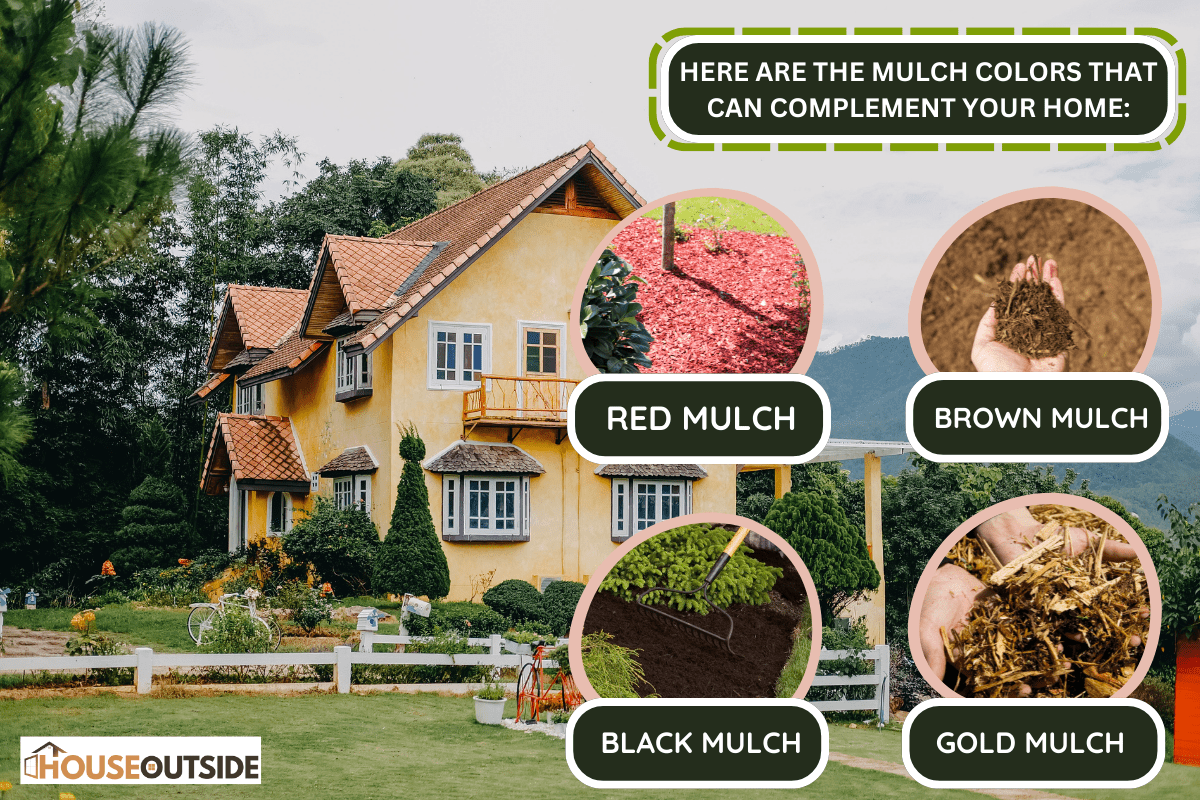
What Mulch Color Goes With Yellow Houses?
Mulches do not only improve the health of your garden--they can also add visual appeal to your home. This is why choosing the right color for your yellow house is essential. You wouldn't want to ruin your home's appeal by choosing mulches that clash with yellow!
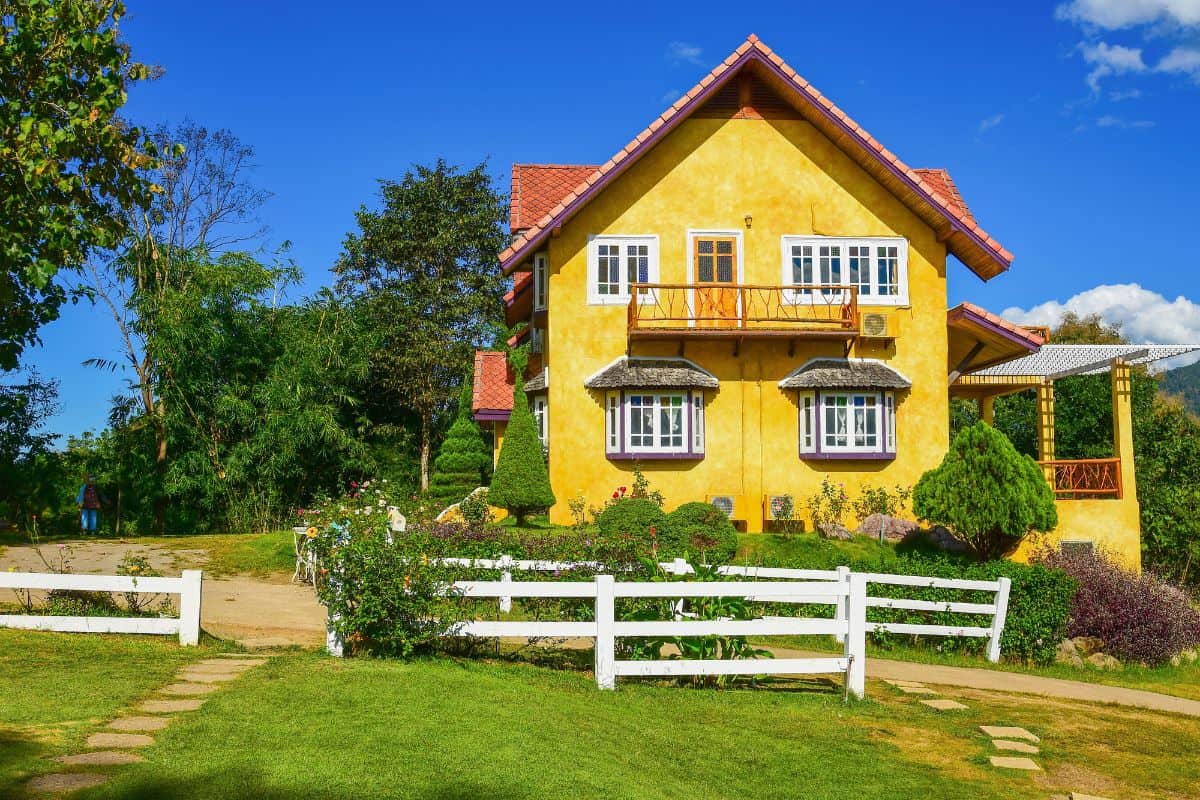
Fortunately, these color options are mostly natural colors, so you can rarely go wrong with them. Here are the mulches that can complement your yellow house.
Red Mulch
Red mulch is just wood mulch dyed with red. It has a striking color that can create visual contrast with your yellow house, making it look more vibrant and attention-grabbing.
This mulch is ideal if you have matching yellow flowers and deep green shrubs--you can use the mulch to create borders so you can outline your garden better.
However, note that it is safer to go with red mulch that has been dyed with safe vegetable dye so it won't affect your plants negatively in any way.
Brown Mulch
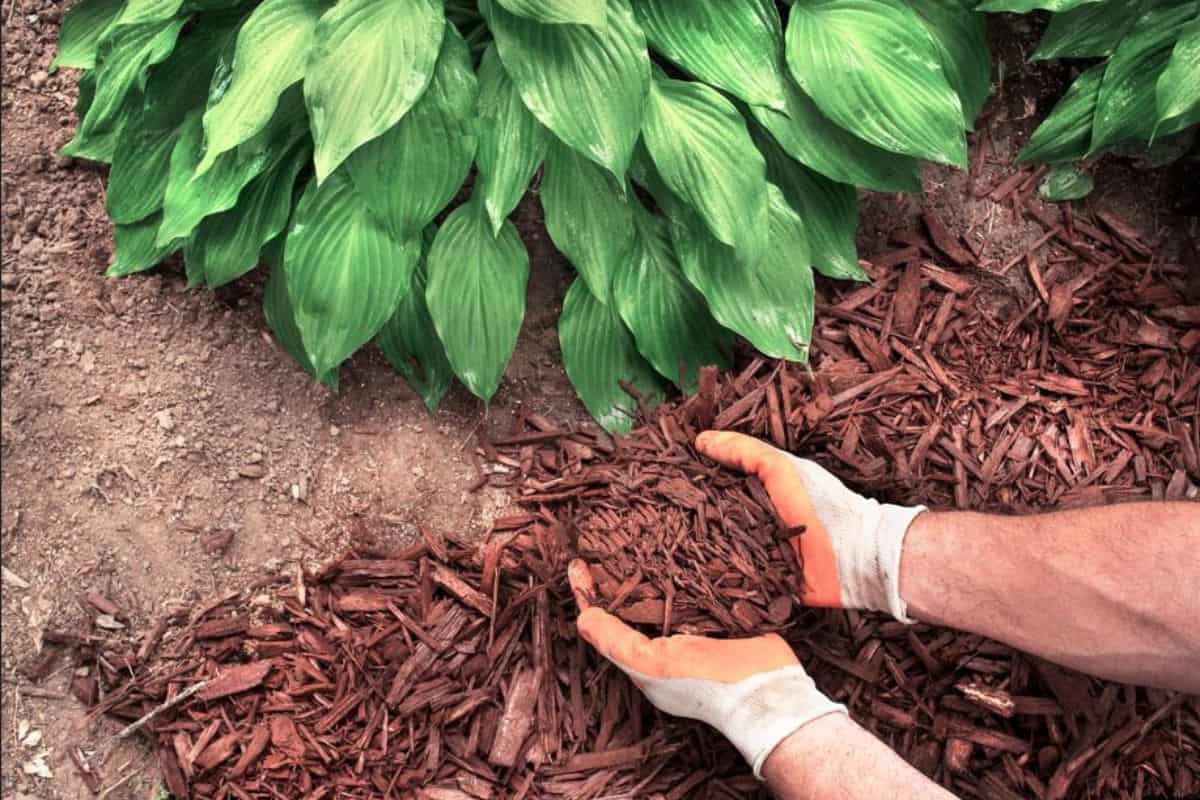
You can't go wrong with brown mulch since it blends into the soil nicely. Browns accentuate your greenery and flowerbeds, and they complement your yellow house by making it look warmer and more welcoming.
However, some brown mulches contain cocoa shells which may be harmful to dogs. Make sure to keep your dogs away from these mulches, or opt for brown mulches that are made with pine, cedar, and cypress--all of which may be safe for dogs to occasionally chew on.
Check out this natural wood chip mulch on Amazon.
Black Mulch
Another mulch color that will match your yellow house beautifully would be black. Black creates visual contrast with the vibrancy of yellow, giving the entire space depth and dimension.
Black mulch is known for being long-lasting, so these are a good option if you want something that you won't have to change often. However, a downside of black mulch is that it absorbs sunlight a lot, potentially drying out the mulch easier than other colors.
Black mulch is ideal if you need your plants or shrubs to retain heat and attract sunlight, especially if you live in a cold area.
Gold Mulch
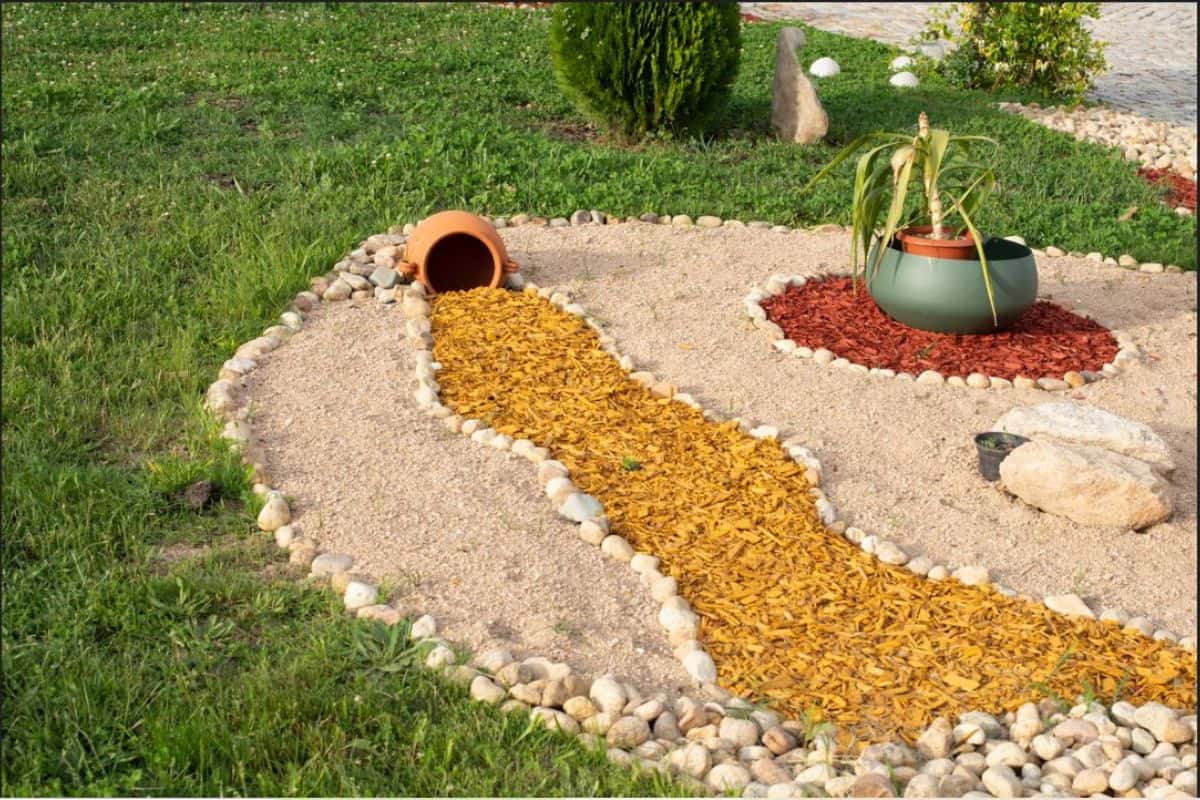
Gold mulch is the best mulch color you can go for. It blends perfectly with the warm tones of your yellow house, and it can add charm to your garden without being visually overwhelming. These provide a gorgeous backdrop for your rich green plants and flower beds.
Gold mulches also retain moisture well during the summer since it's a lighter color that reflects light away. It's a great option if you live in an area that experiences harsh summers and abundantly sunny afternoons.
If you live in an area that experiences frost, yellow mulch can also insulate the roots and protect them from frost.
Benefits of Mulch
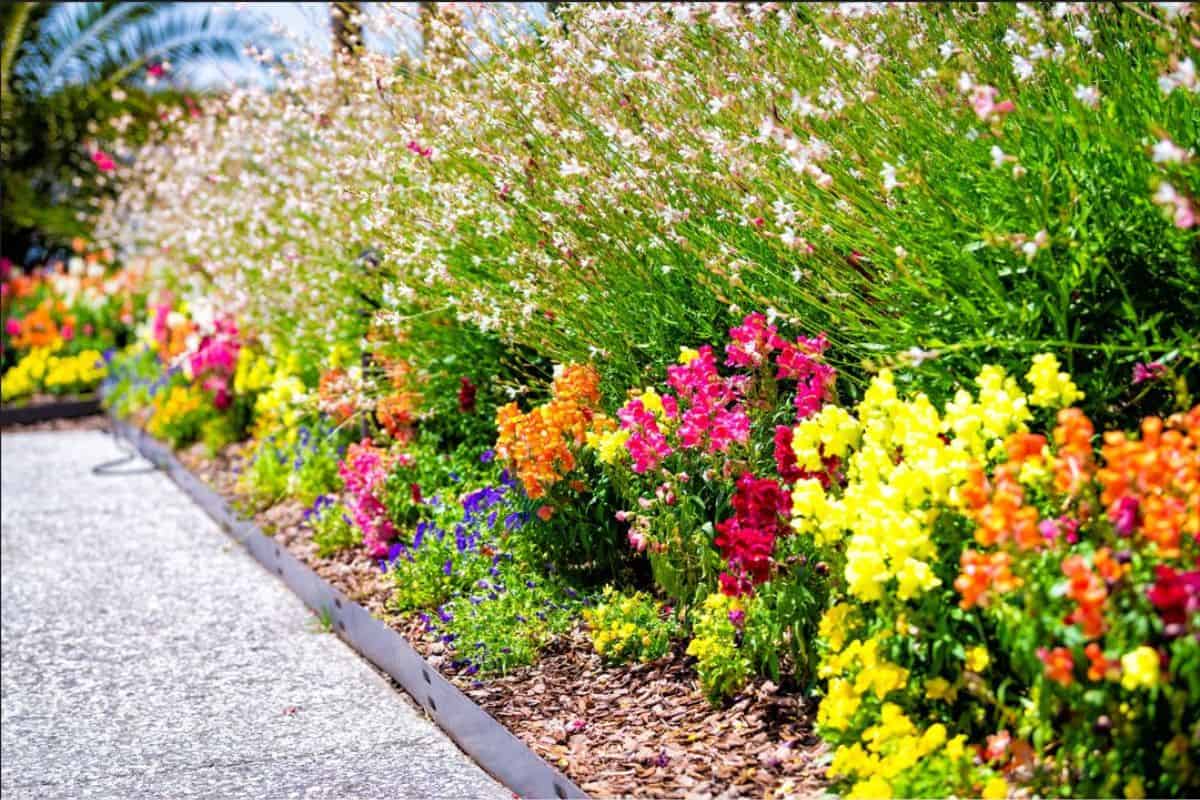
Garden mulch has a lot of advantages, but you need to make sure that the materials will not harm any pets, and that they are compatible with the types of plants you have in your garden.
For example, black mulches may be good for gardens located in cold climates, but you can't put them under plants that need a lot of water to thrive.
On the other hand, brown mulch is extremely useful for most plants, but you need to be mindful of the crushed materials so that they won't harm your pets.
Other than those reminders, here are the benefits of having mulch in your garden.
Retains Moisture
Mulch is typically made with shredded bark and wood chips. These materials make water soak through the soil until it reaches the roots, nourishing the plants.
Mulches act as a barrier between heat, air, and moisture. They allow water to seep through inside without much resistance since the mulch blocks heat radiation.
However, make sure not to lather the mulch on too thickly so they won't suffocate the roots and block the light and water entirely--after all, these elements are still necessary to grow the plants.
Resists Weed
Mulch is a great choice if you’re struggling with weed infestation. Weeds grow when the seeds get access to adequate sunlight. Since mulch can partially block out too much sunlight, weeds won’t have the ideal environment to grow.
Weeds thrive on dirt, so when every corner around your plant is covered with mulch, weed seedlings won't be able to make their way near your plants.
The ideal thickness for the mulch to suppress the weeds while preventing the plants from drying out is not more than three inches. Make sure to provide adequate space between the mulch and the plants, especially flower stalks.
Less Risk For Erosion
Mulches, especially inorganic ones, have an impermeable form that controls the amount of water that penetrates the soil. This makes the soil less at risk for erosion.
Straw mulch is especially great at preventing erosion, so you might use these if you're worried about your soil and the weather in your area.
If you're just starting to grow your garden and have planted seedlings, you should use mulch specifically used to prevent erosion. Make sure to cover at least 85% of the soil to act as a protective layer from unpredictable weather patterns.
Controls Soil Temperature
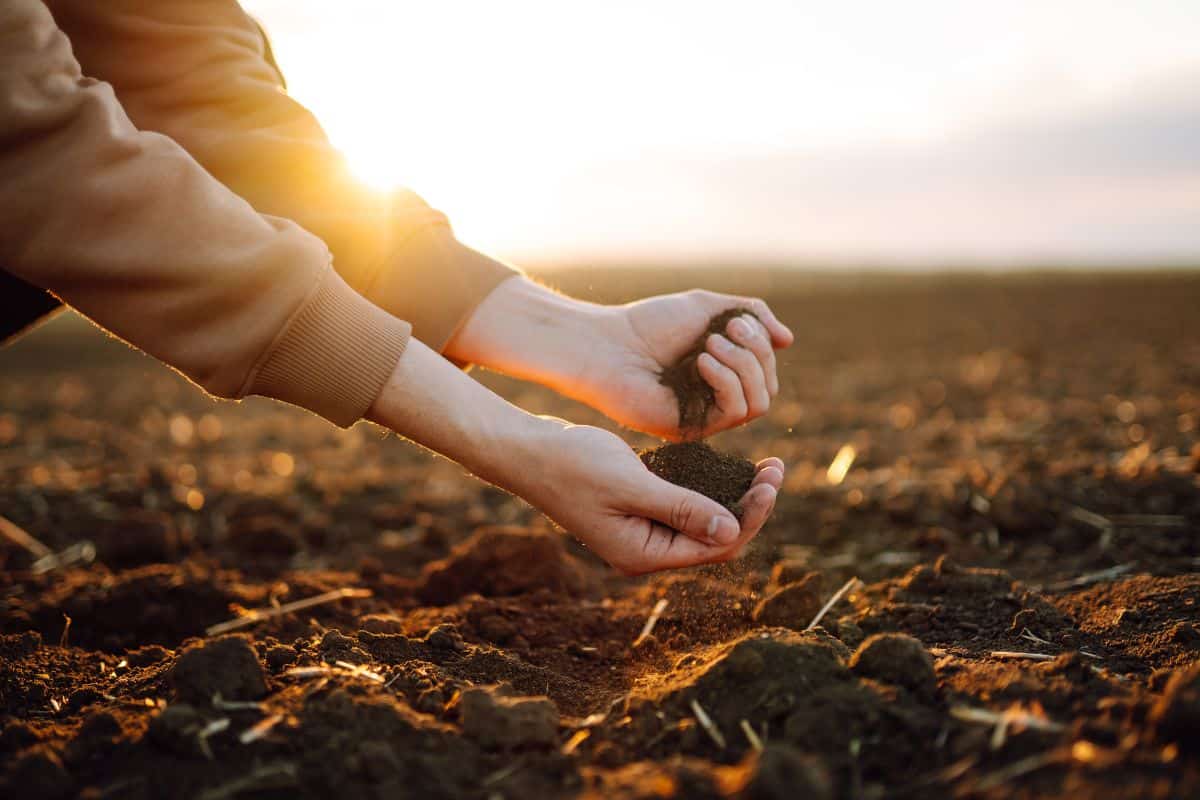
Mulch can regulate your soil's heat levels. A soil that is too hot is at risk of drying out, killing your plants, especially during long periods of drought. Conversely, soil that is covered with frost can also damage your plants.
Mulch can prevent your soil from overheating and making moisture evaporate too quickly by acting as a barrier and "trapping" moisture to keep the plant's roots watered.
Black mulches can also protect the soil from getting affected by colder temperatures by absorbing heat and keeping your plant's roots healthy.
Ultimately, the key is to choose a garden mulch that is ideal for the weather patterns in your area.
Injects Nutrients Into The Soil
Organic mulch, especially those mixed with compost, breaks down nutrients that your plants use to thrive and develop fully. Even plain organic woodchips contain nitrogen, calcium, and potassium which are all essential to plant growth.
Decomposing woodchips also release phosphorous and sulfur, which are excellent plant foods for crops and vegetables.
Note that inorganic mulch does not provide these nutrients to your plants. So, if your goal is to inject nutrients into your plants, go with organic mulch.
Inorganic Vs. Organic Mulch -- Which Is Better?
If you're asking yourself whether organic or inorganic mulch may be better, the truth is there is no straightforward answer. It all depends on your priorities, and whether you're willing to risk the disadvantages for their advantages.
For instance, the main purpose of organic mulch is to break down nutrients that can expedite the development of your plants. However, you'll need to watch out for the pests that organic mulch may attract.
On the other hand, inorganic mulch typically just prevents erosion and weed growth. If these are the only things you are looking for, inorganic mulches may be for you. They are focused on preventing damage than putting nutrients into the plants.
Check out this rubber mulch on Amazon.
Final Thoughts
Mulches are highly beneficial for the garden, but you should consider both their function and visual appeal so you can fully take advantage of their qualities. As always, make sure to maintain them--especially organic mulch--so they can consistently beautify and protect your garden.
For more great exterior design tips, check out:



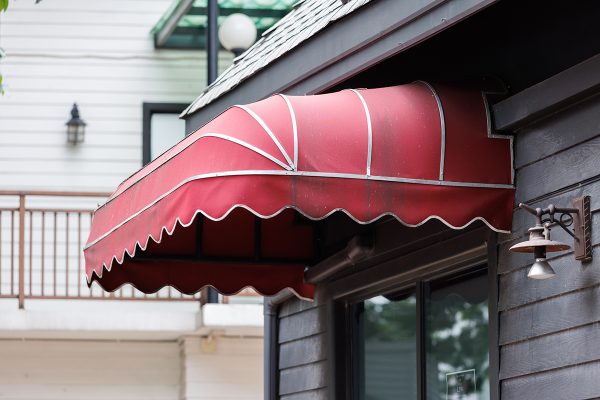
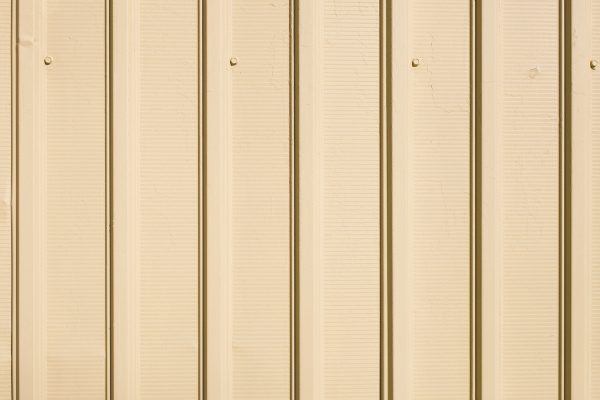
![Roof Gutter Cleaning Tips. Clean Your Gutters. Gutter Cleaning., Do Gutters Smell? [And What To Do About It]](https://houseoutside.com/wp-content/uploads/2022/10/Roof-Gutter-Cleaning-Tips.-Clean-Your-Gutters.-Gutter-Cleaning.-600x400.jpg)